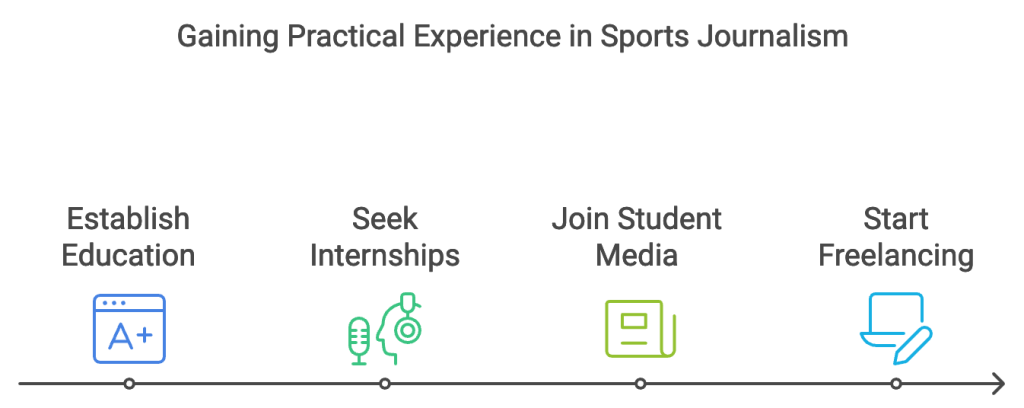How to Build a Career in Sports Journalism
If you’re passionate about sports and have a knack for storytelling, a career in sports journalism could be a flawless fit for you. Imagine being the person who gets to cover thrilling games, interview athletes, and share all the behind-the-scenes action with fans everywhere! Whether writing articles, producing videos, or hosting a podcast, sports journalism offers a unique opportunity to turn your passion into a profession. Here’s a guide to help you start your career in this dynamic field.
Step 1: Get Educated
The first step is getting the proper education. While it is possible to break into the industry without a degree, having a background in journalism or communications can provide a substantial advantage.
Step 2: Gain Practical Experience
Once you’ve established your education, it’s time to acquire hands-on experience. Practical experience is vital in sports journalism, so take every opportunity to get involved.
Internships: Seek internships at local newspapers, radio stations, or sports networks. These positions are invaluable for gaining real-world experience and building connections that could help you secure a full-time job. A plethora of successful sports journalists, like Doris Burke, began their careers in local media before moving to major networks.
Student Media: Join your school’s newspaper, radio station, or TV channel. Cover local sports events, write articles, and produce content to create a strong portfolio. This experience helps you learn the ropes and become comfortable in front of a camera or behind a microphone.
Freelancing: Start writing, and don’t wait for a job to come to you! Consider freelancing for online sports websites, blogs, or local publications. Platforms like Medium or FanSided constantly seek fresh voices, providing a fantastic way to showcase your work.

Step 3: Find Your Unique Voice
Developing your unique voice is essential in a competitive field like sports journalism. Authenticity can help you connect with your audience and distinguish yourself from the crowd.
Personal Branding: Identify what makes you different, whether it’s your writing style, your perspective on sports, or your sense of humor. Building a personal brand means showcasing your individuality and letting your personality shine through in your work.
Storytelling Techniques: Mastering storytelling is crucial. Take inspiration from renowned journalists like Rick Reilly, known for his engaging narratives and humor. Learn how to craft compelling stories that resonate with readers and capture the excitement of the game.
Step 4: Navigate Challenges in Sports Journalism
Every career has its challenges, and sports journalism is no exception. Here’s how to navigate some common obstacles:
Handling Criticism and Rejection: In a world where opinions circulate quickly, you’ll face criticism. Established journalists like Adrian Wojnarowski have faced challenges but have continually proven their worth by breaking significant stories. Learn to accept feedback and use it to improve. Rejection is part of the game; every pitch turned down is an opportunity to refine your ideas and return stronger.
Staying Objective vs. Showing Passion: Balancing your love for the sport with journalistic integrity is crucial. While your passion drives you, maintaining objectivity is essential for credibility. Strive to report fairly while sharing your unique insights to keep your content engaging.

Step 5: Build Your Network
Networking is invaluable in sports journalism. Building connections can lead to job opportunities, collaborations, and valuable advice.
You never know who might notice you!
Step 6: Hone Your Skills
To succeed in sports journalism, you need a diverse skill set. Here’s how to sharpen those skills and stand out:
Writing and Reporting. Focus on writing clear, engaging articles that capture the excitement of the game. Interview athletes, coaches, and fans to bring real stories to life. Learn from journalists like Sam Amick, known for his in-depth reporting.
Multimedia Skills. Today’s sports journalism extends beyond words. Learn how to create videos and podcasts, and become proficient in editing software like Adobe Premiere Pro or Final Cut Pro. Being skilled in multimedia increases your versatility and attractiveness to employers.
Data Analysis. As analytics gain importance in sports, understanding stats and data can give you an edge. Familiarize yourself with player statistics, game performance, and trends. This knowledge allows you to provide more profound insights in your reporting.

Step 7: Find Your Niche
Sports journalism is vast, so finding your niche can help you stand out. Here is something recommendations:
- Consider specializing in a specific sport, basketball, soccer, or esports. Being an expert in a particular area can make you the go-to person for that sport’s coverage.
- Explore different formats. Don’t limit yourself to just articles. Consider podcasts, video content, or social media. This approach broadens your reach and enables you to engage with a wider audience.
- Search for opportunities to highlight lesser-known sports, women’s, or local teams. Many outlets seek fresh perspectives and stories that deserve attention.
Success Stories of Notable Sports Journalists
Learning from those who have paved the way in sports journalism can provide valuable insights and inspiration for your career. Here are a few success stories of prominent sports journalists who have made significant impacts in the industry:
- Erin Andrews
Erin Andrews is a household name in sports journalism, known for her work as a reporter and co-host on major networks like ESPN and FOX Sports. She began her career on local television, reporting on college sports, before transitioning to ESPN, where she gained fame covering college football. Andrews faced challenges, including a highly publicized personal incident that she turned into an opportunity for advocacy against stalking. Today, she is a respected sports journalist and a role model for aspiring female journalists, promoting resilience and empowerment in the industry.
2. Adrian Wojnarowski
Adrian Wojnarowski, often referred to as “Woj,” is one of the most influential basketball journalists in the world. Known for breaking major NBA news and trades, Woj started his career at a local newspaper before moving to ESPN, where he has become a key figure in sports reporting. His ability to build relationships with players, coaches, and agents has given him unparalleled access to insider information. Woj’s success underscores the importance of networking and establishing trust within the sports community.
3. Bill Simmons
Bill Simmons began his journey as a sports writer for ESPN and quickly gained a following for his engaging writing style and pop culture references. He launched the successful “Grantland” website, which blended sports and culture, and later founded The Ringer, a multimedia platform. Simmons’ innovative approach to sports journalism emphasizes the importance of finding your niche and creating content that resonates with a broad audience. His success illustrates many paths within sports journalism, including writing, podcasting, and digital content creation.
4. Rachel Nichols
Rachel Nichols is known for her comprehensive basketball coverage, including her work on ESPN and CNN. She started her career as a reporter for the Fort Lauderdale Sun-Sentinel and later worked for The Washington Post, where she gained recognition for her in-depth reporting. Nichols has been a pioneer in advocating for women in sports journalism, often highlighting issues related to gender equality in the industry. Her commitment to authentic storytelling and representation has made her a respected voice in the sports media.
5. Linda Cohn
Linda Cohn is a trailblazer in sports broadcasting, famously known as the first female anchor at ESPN. She has been with the network since its inception and has reported on countless major sports events over the decades. Cohn’s ability to connect with viewers through her passion for sports has earned her a loyal audience. Her story is a powerful reminder of the importance of perseverance and breaking barriers in a male-dominated industry.
6. Jemele Hill
Jemele Hill is a top-rated sports journalist known for her work with ESPN and The Atlantic. She has been a strong advocate for social justice and has used her platform to discuss the intersection of sports and politics. Hill’s journey reflects the evolving nature of sports journalism, where journalists can engage with broader societal issues. Her courage in addressing controversial topics highlights the importance of using your voice to create meaningful conversations.
These success stories of notable sports journalists showcase the diverse paths one can take in the industry. Each journalist has faced challenges, adapted to changes, and made a significant impact uniquely. By learning from their journeys, aspiring sports journalists can gain insights into the skills, determination, and creativity required to build a successful career in this exciting field.

Conclusion
A career in sports journalism is an incredible way to blend your love of sports with storytelling. You can achieve a fulfilling career with the proper education, hands-on experience, and effective networking. Stay passionate, keep honing your skills, and don’t hesitate to put yourself out there. The world of sports journalism is eager for your unique voice, and you might just become the next big thing!



